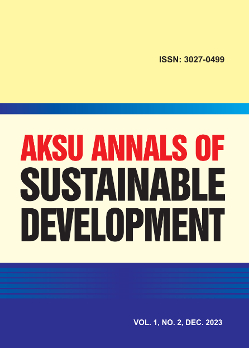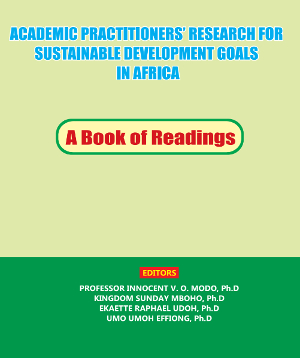MECHANIC’S AND SUCHMAN’S INTELLECTIONS OF HELP SEEKING AND STAGES OF ILLNESS BEHAVIOUR AS EXPONENTIALS OF EFFECTIVE UTILIZATION OF HEALTHCARE SERVICES IN NIGERIA
Abstract
Health seeking behaviour is a manifestation of the propensity to stay healthy. According to the World Health Organization (1951), health is “a complete state of physical, mental and social wellbeing and not merely the absence of disease or infirmity”. Implied in this definition is the fact that health is a utopia, in plain terms, an unattainable goal. It means that nobody is qualified to claim health. Predicated on this problematic nature of this definition, WHO (1986) effected an adjustment of this definition and presented health as, ''the extent to which an individual or group is able, to realize aspirations and satisfy needs, and on the other hand, to change or cope with the environment”. From this standpoint, health is seen as a resource for everyday transactions, instead of the object of living.
This view objectifies social and personal resources as well as physical capabilities. Many scholars had also given their definitions of health for example; Pander (1987) quoted in Etobe (2005), described health as, “The fulfillment of intrinsic and extrinsic possibilities through object-directed behaviour, effective self-care, and convivial relationships with others as well as adjusts to ensure reasonable flexibilities to achieve structural incorruptibility and congruence with the environment.” Though this view seems a bit flexible, it has not been able to point to the extent to which it can be evaluated (Etobe, 2005). In another bold relief, health is painted as going beyond a specific status and oriented towards a resounding process of change indigenous to the various definitions of health from different people. In reacting to the scenario created by these definitions of health, one can safely conclude that health is a phenomenon that presents different impressions to different people or puts differently, society that an individual lives, creates an impression of health, and influences the
conceptualization of health for example, an individual with rashes on the skin may be classified as unhealthy in a particular society, while in another society, such an individual is classified as healthy.
Bar prejudice to the multiple views held on health, it could be regarded as a stage of life that an individual obviously functions maximally to the extent that the psychological and physical composition of an individual are logically and legitimately oriented to harnessing available opportunities and potentials for personal and communal benefits. The inspiration to satisfy the interest of society in this perspective boldly emphasizes the desirability of a convivial environment as facilitating medium for appropriate health seeking behaviour. To attain this height demands that the rubrics and standard of health must be famously entrenched in the consciousness of society, to assess specific accomplishments, reactions and responsibilities. In doing this, care must be taken to prevent the weakness of cultures from dampening the actualization of these projections if such efforts are geared towards health as an asset with multiplier utility.
Downloads
References
Ahmed, S. M., Tomson, G., Retzold, M., and Kabir, N. K. (2005). Socio-economic Status overrides age and gender in determining health seeking behavior in rural Bangladesh Bulletin of the World Health Organization; 83(2): 81-160.
Aghanim's. A. (2020). Self-medication practice among patients in a public Health Care system. In: Eastern Mediterranean Health Journal Vol, 26. Pp 120-125
Effiong, U. and Ekpenyong, O. (2017). Community Based Rehabilitation Services and Livelihood Enhancement for Persons with Disabilities in Nigeria: A Case Study of Akwa Ibom State. Journalof Sociology, Psychology and Anthropology in Practice, 8(1), 62 – 67.
Effiong U., Kingdom M. and Wordu S. (2018), Post-Civil War Experience and Women with Disabilities in Nigeria. Journal of Research in Education and Society, 9(2), 105–126.
Ekong, E. Ekong (2006). Sociology of Health and Medicine. Uyo: Dove International Publishers
Etobe, I. E. (2005). Sociology of Health and Rehabilitation. Published by De Arizona Federal Ministry of Health (2008). The Nigerian health financing policy, Federal Ministry of health (FMOH). Abuja, Nigeria.
Huber, M., Knottnerus, J. A., Green, L., van der Horst, H., Jadad, A, R., KromHout, D., & Smid, H. (2011). How should we define health? BMJ; 343: 563.
Iyalombe, G. B. (2012). Health seeking behavior of rural dwellers in Southern Nigeria: Implication for healthcare professionals. International Journal of Tropical Disease and Health: 2(2)62-71.
Khadka and Ahikara (2022) Health seeking Behaviour and Self-medication Practice among undergraduate medical students of teaching hospital: a cross sectional study. In Annals of Medicine and Surgery. Volume 78, June, 2022, 103776.
Leyva-Flores R., Kageyama ML,, Erviti-Erice J.(2021) How people respond to Illness in Mexico Self-Care or Medical Policy? Health policy 57:15-26.
Ng'ambi, W., Manga, T., Phillips, A., Colbour, T., Mfutso-Bengo, J., Revil, P and Hallet, T. B. (2016). Factors associated with Healthcare seeking behaviour for children in Malawi. Available at https://doi.org/10.1111/tmi.13499.
Nkanta, N. C. (2019). Socio-Economic Factors Affecting Health Seeking Behaviour of the people of Akwa Ibom State. Unpublished Thesis, Department of Sociology, University of Calabar, Calabar Cross River State.
Rebban, D. P. (2009) Healthcare utilization: understanding and applying theories and models of healthcare seeking behavior. Case study of Western Reserve University.
Sanders, T. D. (2011). Social factors in health seeking behavior. Sublime Publishers. Sheeran, P. and Abraham, C.(1996).The Health Belief Model.In: M Conner and P Norman (eds) Predicting Health Behaviour:research and Practice with social models. Open University Press, Buckingham 23-61.
Stowser T., Heiss F., McFadden D., & Winter J. (2011) “Healthy, Wealthy and Ise?” revisited: An analysis of the causal pathways from socio-economic status to health. NBER working paper series (working paper17273). Cambridge, MA; National bureau of economic research.
Suchman, E. (1965). Patterns of Illness and Medical Care. Journal of Health and Human Behaviour ; 6(3): 114-28.
Uche, Omeire Edward (2017). Factors Affecting Health Seeking Behaviour among Rural Dwellers in Nigeria and its Implication on Rural Livelihood. European Journal of Social Science Studies, 2, Issue 2. Available at: www.oapub.org/SOC
Uchudi, M. (2011). Covaries of child mortality in Mali: does the health seeking behaviour? J Bio Sci;33: 33-54
Wolinsky, D. F. (1988). The Sociology of Health. California: Wadsworth publishing company.
Downloads
Published
Issue
Section
Categories
License
Copyright (c) 2024 AKSU Annals of Sustainable Development

This work is licensed under a Creative Commons Attribution-NonCommercial-NoDerivatives 4.0 International License.
Manuscript content on this site is licensed under Creative Commons Licenses. Authors wishing to include figures, tables, or text passages that have already been published elsewhere are required to obtain permission from the copyright owner(s) for both the print and online format and to include evidence that such permission has been granted when submitting their papers. Any material received without such evidence will be assumed to originate from the authors.





 ICIDR Publishing House
ICIDR Publishing House